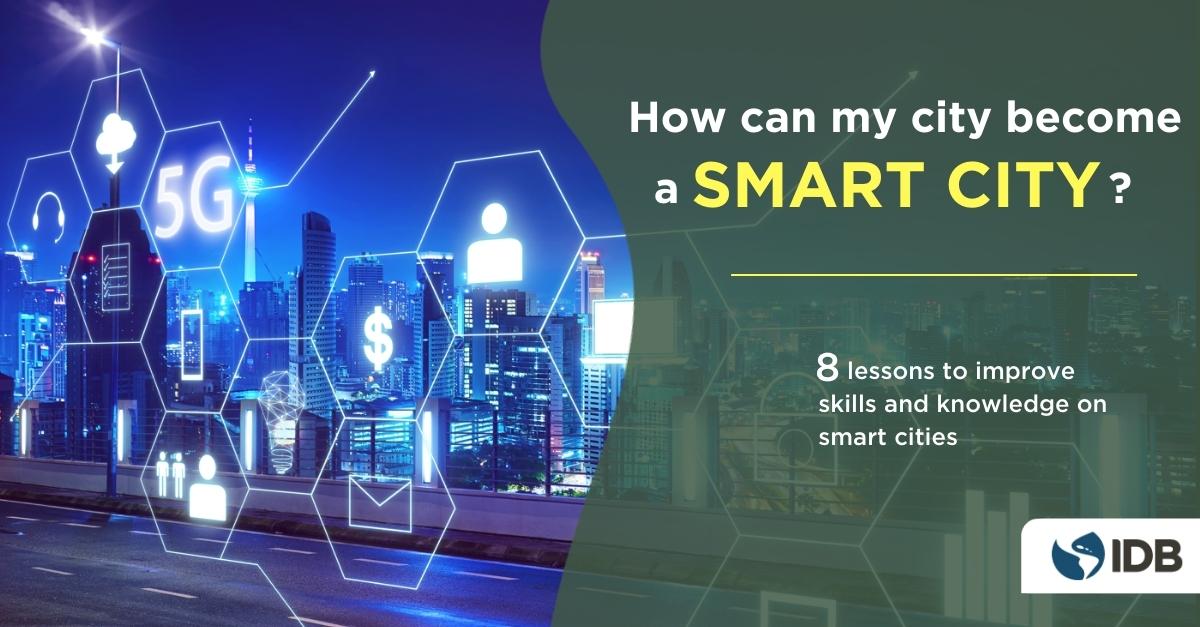Este artículo está también disponible en / This post is also available in: Spanish
In Latin America and the Caribbean (LAC), smart city projects are still in an initial stage and take the form of somewhat isolated initiatives. Although at first glance this may seem a problem, it is an opportunity, as it allows us to learn from the successes, and also from the mistakes, of other regions where these types of projects are more advanced.
One of the countries where smart technologies applied to cities have been most developed is South Korea. The Inter-American Development Bank (IDB), in its mission of improving lives in LAC through innovation, has been collaborating with the Ministry of Land, Infrastructure and Transport of the Republic of Korea (MOLIT) since 2019 to implement projects to develop smart technologies in the cities of our region.
In 2023, during April and May, the IDB, in collaboration with MOLIT, organized a training aimed at sharing ideas and experiences on smart city initiatives to municipal leaders in Brazil. Keep reading to learn more about this webinar series and discover how to take the first steps to turn your city into a smart city.
What is a smart city?
A smart city is a city that integrates digital technologies into its networks, services, and infrastructure, making it more efficient and livable. By collecting, analyzing, and utilizing data from sensors, devices and citizen input, a smart city can improve its operations, services, and decision-making processes, ultimately improving the quality of life of its residents.
Big Data for Smart Cities
The growing demand for information and advice on smart cities, has led the IDB to organize the training program: “Big Data for Smart Cities”. This initiative, executed with financial support from MOLIT, is designed to improve the skills and knowledge of Brazilian public officials in smart city technology.
The webinars were developed in Portuguese as they were conducted for Brazilian municipal leaders. However, they will soon be available in Spanish and English as well. Below is a summary of the eight classes included in the program, which we hope will be useful to cities throughout the region in their goal of applying technology initiatives to improve the lives of their residents and businesses:
1. Smart Cities Application Cases: Understanding and applying smart cities with a focus on citizen participation:
This session explained the concept of smart cities and the crucial role that citizens play in driving innovation. Also, Seok Kyung Kim, speaker of the session, discussed what is the role of smart cities and successful Korean strategies were shown.
2. Smart services for smart cities:
With technology constantly evolving, an increase in the number of self-driving cars, urban air mobility, robotics, digital replication, and mechatronic technologies on the Internet of Things (IoT) is expected. Young Jun Kim, speaker for this session, delved into smart services and their correlation to smart cities.
3. Big Data in the smart city:
Su Jae Lee, speaker for this session, delved into the complex problems that urban areas often face. He also addressed how advanced smart technologies, such as big data and networks, can be effectively leveraged to better solve these challenges.
4. Strengthening Urban Data Utilization and Citizen Engagement: An Introduction to Artificial Intelligence Cities Created by Data:
This session provided an overview of the historical evolution of cities. Hee Dae Kim, the seminar speaker, highlighted the importance of data-driven, citizen-led urban laboratories. Cases of smart city operations and lab methodologies focused on citizen participation were presented.
5. Urban mobility technologies based on big data + artificial intelligence for smart cities:
Professor Hyun Myeong shared his knowledge on big data and its practical applications in smart city management. He also delved into the different techniques used for data collection, providing valuable insights on the subject.
6. Understanding the integrated smart city platform:
In this class, Gyeong-Hun Kim explains what an integrated platform is and how it has evolved over the years.
7. Energy efficiency and smart buildings:
The issue of energy consumption is of great importance. Given the large amount of energy needed, it is essential to look for methods to optimize its use. This session, Ki-Do Oh discussed the certification of such structures as smart energy consumers, encouraging builders to adopt energy-efficient practices.
8. Korea’s Smart Disaster Safety Management:
How can we use real-time 3D spatial information and a smart multi-sensor to detect fires in subway utility tunnels when developing smart cities? This session, Woo Sug Jung shows how technology can prevent disasters and be the answer to prevention on the ground, making it a vitally important tool.
Interested in smart cities?
In the Urban Development and Housing Division, we are working to make LAC cities more innovative, efficient and sustainable. The use of technology, big data, artificial intelligence, or the internet of things can solve many of the problems faced by our municipalities and improve the lives of those who live in them.
If you are interested in learning more about our work, and that of MOLIT (click here to know more about smart cities in Korea, and here to join a tour if you are visiting Korea), we encourage you to write to us in the comments section – we’ll be happy to read and respond!
In the meantime, feel free to follow us on our social networks on LinkedIn, Facebook and Twitter so you don’t miss any updates on our work improving lives in the region.


Leave a Reply